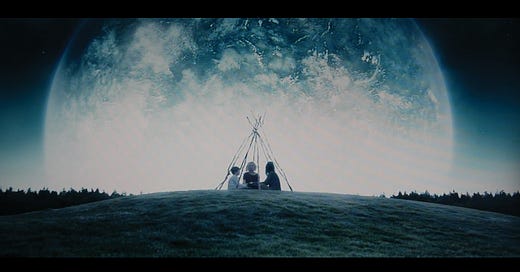Intro: Since posting this as a video essay in 2019, I’ve received numerous requests for a transcript. At this moment, the video has been viewed 33,000 times. The essay is based on draft material for my forthcoming book Ego & Extinction: Ecopsychology and Science Fiction (2023, Anti-Oedipus Press). The transcript is divided into sections, in order to make it a little easier to read online.
Part Two: Claire
Your soul is like a landscape fantasy,
Where masks and Bergamasks, in charming wise,
Strum lutes and dance, just a bit sad to be
Hidden beneath their fanciful disguise.
Singing in minor mode of life's largesse
And all-victorious love, they yet seem quite
Reluctant to believe their happiness,
And their song mingles with the pale moonlight,
The calm, pale moonlight, whose sad beauty, beaming,
Sets the birds softly dreaming in the trees,
And makes the marbled fountains, gushing, streaming—
Slender jet-fountains—sob their ecstasies.
—Paul Verlaine, “Claire de Lune” 1869
It is tempting to regard—and there is some truth in this—Claire as the dark-haired Yin to Justine’s blonde Yang, sister-counterparts each containing something of the other. Claire is “afraid of that stupid planet.” Justine reverses this sentiment, “If you think I’m afraid of a planet then you’re too stupid.” Yet, that easy analogy seems, to me, incomplete. Claire depends upon John, and upon Little Father, the valet. Little Father is, of course, a substitute for Claire and Justine’s real father, Dexter, the forsaking, non-consolatory father. Little Father is a distinctly Freudian totem of phallic order, in a film where masculinity is diminished, and rendered irrelevant, silly. On the eve of Melancholia’s fly-by, Little Father will abandon the house, and the family. Claire becomes concerned when she cannot contact him. “Does he have a family?” Justine asks. “He lives in the village,” Claire replies, “I don’t know if he has a family.” Claire is, quite reasonably, concerned with the element of Justine within herself, the potential of shared illness that goes unspoken. At another point, John asks her, “Is everybody in your family stark, raving mad?”
Early in Part Two, John seeks to reassure Claire. Melancholia, he says, is “a wonderful planet. First it was black. Now it’s blue, blocking Antares and hiding behind the Sun. Sweetheart, you have to trust the scientists.” He explains, “Melancholia is just going to pass right in front of us, and it’s going to be the most beautiful sight ever.” This is the surface voyeurism of the film, that a Romantic imperative is being fulfilled in the deterioration of a beautiful young woman; Justine as morbid bride embodies melancholy as the ravishing personal subjective of depression, and she is psychic doppelgänger to its archetypal planetary projection; it is her projection, her representation, her intellectual relation to will, the melancholic’s reverie. As Schopenhauer says of Nature, almost as it were in anticipation of John, “But is the world, then, a peep-show? These things are certainly quite beautiful to behold, but to be them is quite different (Vol. II, 581).” Otto Rank’s writing on “Microcosm and Macrocosm” discusses this zodiacal mapping upon the body, or magical anatomy and celestializing-personification in some detail.
Keep reading with a 7-day free trial
Subscribe to James Reich to keep reading this post and get 7 days of free access to the full post archives.




